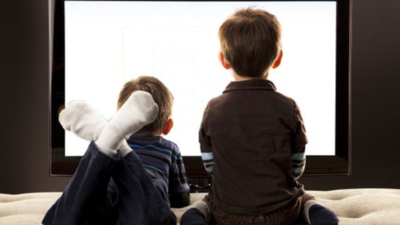Trending
Effects of excessive screen time on child’s behavior
The digital era has caused a haphazard in the lives of Gen-Z kids who are now dealing with behavioral issues due to excess screen time in their childhood. Let’s take a look at some of the effects of excessive screen time on a child's behavior and how it can cause an issue in the long run.

(Image Credits: Pinterest)
In today's digital age, people are heavily influenced by and dependent on technology and screen media, with adults and kids both using screens past the expected limit. Excessive screen time can have a negative and positive effect on a kid's development. When discussing cognitive development, screen time should be limited to improve a child's education, but not for multitasking, such as watching movies or playing video games.It is a fact that media multitasking can negatively impact children, affecting their sensorimotor development, executive functioning, and academic outcomes.
One of the most important effects is the impact on the child's language development, as long screen time diminishes the quality and quantity of interactions between the child and their caregivers and friends. Access to appropriate content can also impact the child's language development, leading to social-emotional problems, sleep disturbances, anxiety, and sometimes even depression.
Effects of too much screen time in kids
Lack in sleep
Altering the brain cells
Too much screen time might also cause physical changes to your brain. As the outer layer of the brain, i.e., cortex, processes information during the growing stage, it undergoes critical development. Screen time may affect this growth and can lead to a thinner layer of the cortex, which can cause issues academically and cognitively in the near future.
Mood swings
Too much texting and scrolling can play with your emotional health and may increase the symptoms of depression. Excessive screen time in kids and teens leads to neglect of their responsibilities, and without their gadgets, they would start feeling anxious, which can lead to great mood swings from crying, , yelling, to anger issues.
In this journey, parents play the only lead role in managing their child's screen time by raising awareness, providing adequate behavioral control, and setting some boundaries. Parental limitations are required as the absence of the adults also should not be an issue so that the kid does not stare at the screen.
Parents should thus set an example by cutting down their own screen time to help their kids realize the importance of and understand the limits and boundaries. Overall, it all depends on the caregivers, educators, or professionals who understand the potential risks of excessive screen time and thus implement some strategies to help them understand alternatives to gadgets and tech screens.
One of the most important effects is the impact on the child's language development, as long screen time diminishes the quality and quantity of interactions between the child and their caregivers and friends. Access to appropriate content can also impact the child's language development, leading to social-emotional problems, sleep disturbances, anxiety, and sometimes even depression.
Effects of too much screen time in kids
Lack in sleep
Excessive screen time can disrupt your sleep cycle, because late-night engagement with your device can bar the body from releasing a chemical, melatonin, at night, which requires darkness and peace. It helps your body stay asleep, and if not produced in sufficient amounts, it can keep your child awake, resulting in a difficult and irritating day.
Altering the brain cells
Too much screen time might also cause physical changes to your brain. As the outer layer of the brain, i.e., cortex, processes information during the growing stage, it undergoes critical development. Screen time may affect this growth and can lead to a thinner layer of the cortex, which can cause issues academically and cognitively in the near future.
Mood swings
Too much texting and scrolling can play with your emotional health and may increase the symptoms of depression. Excessive screen time in kids and teens leads to neglect of their responsibilities, and without their gadgets, they would start feeling anxious, which can lead to great mood swings from crying, , yelling, to anger issues.
In this journey, parents play the only lead role in managing their child's screen time by raising awareness, providing adequate behavioral control, and setting some boundaries. Parental limitations are required as the absence of the adults also should not be an issue so that the kid does not stare at the screen.
How to Take Vitamin D Supplements ??
Parents should thus set an example by cutting down their own screen time to help their kids realize the importance of and understand the limits and boundaries. Overall, it all depends on the caregivers, educators, or professionals who understand the potential risks of excessive screen time and thus implement some strategies to help them understand alternatives to gadgets and tech screens.
End of Article
FOLLOW US ON SOCIAL MEDIA











